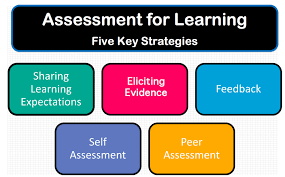Introduction
Assessment for learning (AFL) is an essential skill that plays a crucial role in the educational process. In recent years, educators and researchers have started to place a greater emphasis on the importance of assessment as a tool that enhances the overall learning experience. The goal of Assessment for Learning is to ensure that students are actively engaged in their education and take ownership of their learning journey. By using a variety of assessment techniques, teachers can improve student performance, provide valuable feedback, and adapt their teaching methods according to individual needs. This article will explore the concept of the assessment for learning and its benefits for both students and teachers alike.
What is Assessment for Learning?
Assessment for Learning, also known as formative assessment, is a continuous process where teachers gather information about students’ understanding, skills, and progress during the course of instruction. These insights enable teachers to adapt their instructional techniques to better address students’ needs and optimize the learning environment. Additionally, AFL encourages students to develop self-assessment skills and promotes reflective thinking, giving them a greater sense of responsibility towards their academic achievements.
The Benefits of Assessment for Learning
1. Immediate Feedback: By employing regular assessment practices into lessons, teachers can provide instant feedback to their students. This real-time feedback allows students to understand what they are doing right or wrong and make necessary changes accordingly.
2. Enhanced Student Engagement: Through AFL practices such as quizzes, peer-assessments, or group projects, students are actively involved in every aspect of the learning process. This enhanced engagement has been shown to increase motivation, improve retention, and foster a growth mindset among pupils.
3. Data-driven Instruction: Assessment data can greatly inform future instructional decisions by highlighting areas where learners struggle or excel. Teachers can use this information to adjust their lesson plans accordingly while creating individualized strategies tailored to each student’s unique strengths and weaknesses.
4. Developing Self-assessment Skills: Regular exposure to AFL techniques assists students in developing essential self-assessment skills. By recognizing and understanding their own learning needs, pupils can take responsibility for their progress, and develop the ability to set goals and evaluate their achievements.
5. Encouraging Lifelong Learning: Assessment for Learning fosters a growth mindset among students by emphasizing the idea that intelligence and skills are not fixed but can be improved through dedication and practice. This prepares learners for future challenges and cultivates a lifelong love of learning.
Implementing Assessment for Learning in the Classroom
Effective implementation of AFL requires consistent evaluation, feedback, and reflection. The following practices can help educators introduce assessment for learning to their classrooms:
1. Set clear objectives: Establish specific, measurable goals at the beginning of each lesson or unit and share them with the students to help them understand the purpose of each activity.
2. Utilize various assessment methods: Employ a wide range of assessment techniques, such as oral presentations, debates, multiple choice exams, or peer evaluations, to ensure that all types of learners are given opportunities to demonstrate their knowledge.
3. Encourage self-assessment: Foster a culture where students are encouraged to analyze their strengths and weaknesses, set personal objectives and reflect on their progress regularly.
4. Provide constructive feedback: When offering feedback, focus on the process rather than just the outcome, helping students understand how they can improve moving forward.
5. Collaborate with other educators: Share effective strategies and ideas with colleagues to gain insight into best practices for implementing Assessment for Learning within the school community.
Conclusion
Assessment for Learning is an essential skill that significantly contributes to student success by ensuring active engagement in the education process. Implementing AFL techniques in the classroom allows teachers to provide valuable feedback while adapting instruction according to individual needs, ultimately fostering a lifelong love of learning among.





